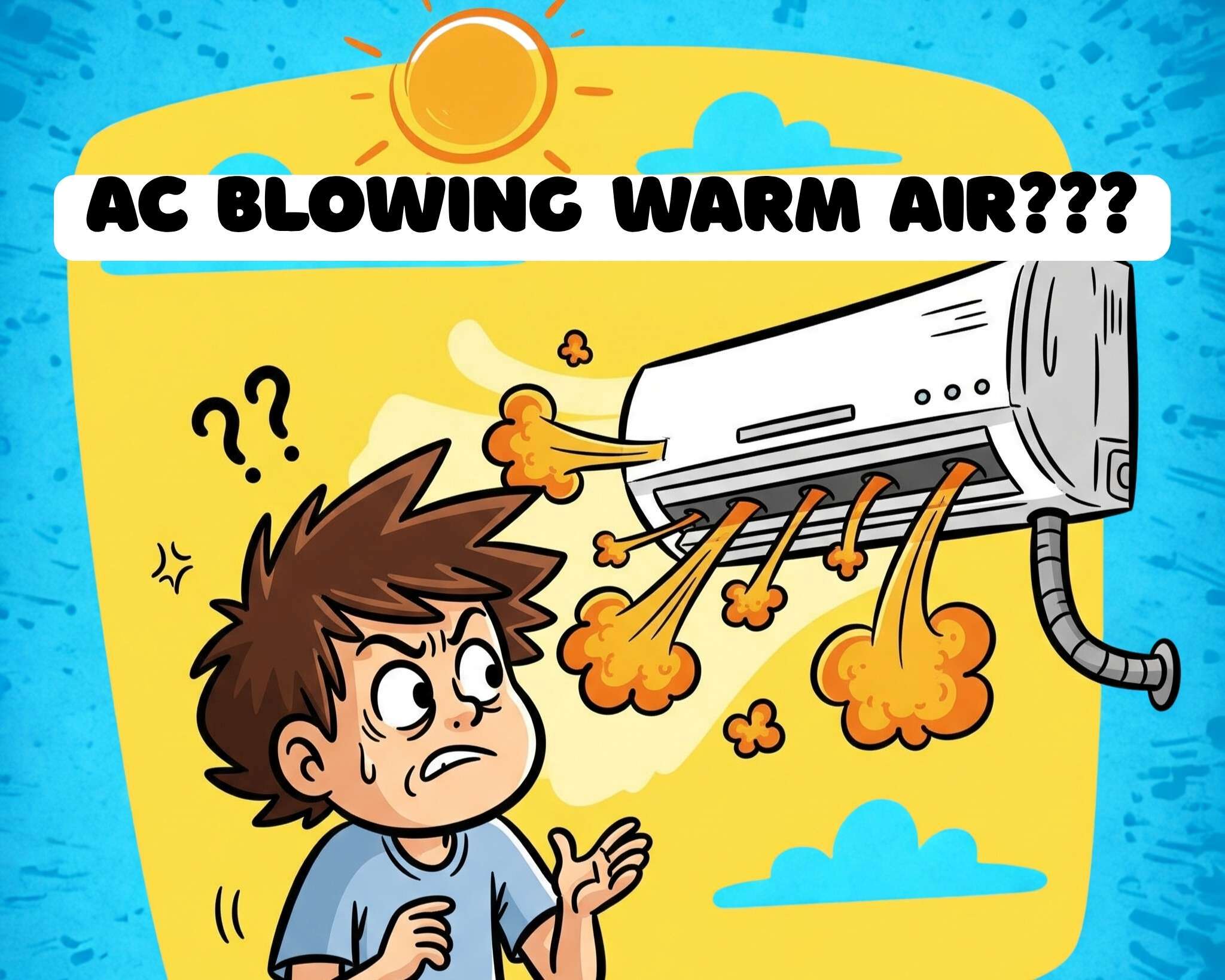
Why Is My Air Conditioner Blowing Warm Air? 5 Common Causes
There’s nothing worse than warm air from your AC during a Texas heatwave. When temperatures in Bastrop County soar into triple digits, discovering that your air conditioner is blowing warm air instead of cool, refreshing relief can turn a manageable day into a miserable one. The good news? This is one of the most common AC issues we encounter, and many causes have straightforward solutions.
At Centex Air & Heat, we’ve been diagnosing and fixing warm air problems for families throughout Bastrop County since 1984. Our master-licensed technicians have seen it all—from simple filter changes to complex compressor failures—and we’re here to help you understand what might be causing your AC troubles and when to call for professional help.
Let’s explore the top five reasons your air conditioner might be blowing warm air and what you can do about each one.
1. Dirty Air Filter – The Most Common Culprit
How a Clogged Filter Restricts Airflow
A dirty air filter is by far the most frequent cause of warm air from your AC system. When your filter becomes clogged with dust, pet hair, and debris, it creates a barrier that restricts airflow through your system. This reduced airflow prevents your evaporator coils from absorbing heat effectively, causing your AC to blow warm or lukewarm air instead of the cool air you expect.
In Central Texas, where dust and pollen levels run high, filters can become clogged much faster than in other regions. This is especially true during spring months when oak pollen blankets everything in sight.
Quick Maintenance Tip
Check your air filter monthly and replace it every 1-3 months, depending on:
- Every month: Homes with pets, smokers, or family members with allergies
- Every 2-3 months: Average households during peak cooling season
- Every 3 months: Homes with minimal dust and no pets during milder weather
This simple maintenance step not only prevents warm air issues but also improves your system’s efficiency and extends its lifespan.
2. Thermostat Set Incorrectly – A Simple Fix
Common User Errors with Settings
Sometimes the solution is simpler than you think. Your thermostat might be set incorrectly, causing your system to behave unexpectedly. The most common setting mistakes include:
Fan Mode vs. Cool Mode: If your thermostat is set to “Fan” or “On” instead of “Cool” or “Auto,” your system will circulate air without actually cooling it. The fan runs continuously, but the compressor doesn’t engage to remove heat from your home.
Temperature Settings: Double-check that your desired temperature is actually lower than your current room temperature. It sounds obvious, but it’s surprisingly common, especially when multiple family members adjust the thermostat throughout the day.
How Smart Thermostats Help
Modern programmable and smart thermostats reduce these user errors by:
- Clearly displaying current mode and temperature settings
- Providing intuitive interfaces that make incorrect settings less likely
- Offering remote access so you can verify settings from anywhere
- Sending alerts when your system isn’t performing as expected
If you’re still using an older manual thermostat, upgrading to a smart model can prevent many common cooling issues while also reducing your energy bills.
3. Refrigerant Leak – A Serious Problem Requiring Professional Help
How Low Refrigerant Causes Warm Air
Refrigerant is the lifeblood of your air conditioning system. This specialized fluid absorbs heat from inside your home and releases it outside, creating the cooling effect you rely on. When refrigerant levels drop due to a leak, your system can’t absorb heat effectively, resulting in warm air from your vents.
Signs of a refrigerant leak include:
- Warm air from vents despite correct thermostat settings
- Ice formation on your indoor evaporator coils
- Hissing sounds from your AC unit
- Higher than normal energy bills
- Sweet or chemical odors near your AC equipment
Why Professional Repair is Essential
Refrigerant leaks require immediate professional attention for several important reasons:
Environmental Protection: Refrigerants are regulated substances that can harm the environment if not handled properly.
Safety Concerns: Some refrigerants can be hazardous to your health, especially in enclosed spaces.
System Damage Prevention: Running your AC with low refrigerant can cause expensive damage to your compressor and other components.
Legal Requirements: Only EPA-certified technicians can legally purchase and handle refrigerants.
If you suspect a refrigerant leak, turn off your system immediately and contact our certified AC repair team for professional diagnosis and repair.
4. Frozen Evaporator Coils – When Your AC Gets Too Cold
Common Causes of Frozen Coils
Ironically, frozen evaporator coils are a common cause of warm air from your AC. When these coils freeze over, they can’t absorb heat from your home’s air, causing your system to blow warm air instead. Several factors can cause coil freezing:
Restricted Airflow: Often caused by dirty filters, blocked return vents, or closed registers in unused rooms. When airflow is restricted, the coils get too cold and freeze.
Low Refrigerant: As mentioned above, low refrigerant levels can cause coils to freeze as the remaining refrigerant expands too rapidly.
Dirty Coils: Dust and debris on the evaporator coils themselves can insulate them, preventing proper heat absorption and causing freezing.
How to Check and When to Call a Technician
What You Can Check:
- Look for ice buildup on the indoor unit (usually in a closet, attic, or basement)
- Ensure all supply and return vents are open and unblocked
- Check and replace your air filter if it’s dirty
When to Call Centex Air & Heat:
- If you see ice on your evaporator coils, turn off your system immediately and call us
- If the problem persists after checking filters and vents
- If you notice water damage from melting ice
Never attempt to chip or scrape ice off frozen coils, as this can damage the delicate fins and tubing.
5. Electrical or Compressor Issues – Complex Problems Requiring Expert Diagnosis
Signs of a Failing Compressor or Capacitor
The compressor is your AC system’s heart, and the capacitor provides the electrical boost needed to start it. When either component fails, your system may run but won’t actually cool your home. Warning signs include:
Compressor Problems:
- AC unit turns on but doesn’t cool
- Unusual noises from the outdoor unit (grinding, squealing, or rattling)
- Circuit breaker trips repeatedly
- Outdoor unit vibrates excessively
Capacitor Issues:
- System struggles to start or won’t start at all
- Humming sound from the outdoor unit without the fan or compressor starting
- Intermittent cooling that stops and starts randomly
Why DIY Isn’t Recommended for Electrical Issues
Electrical components in AC systems carry high voltage and can be extremely dangerous for untrained individuals. Additionally:
Risk of Injury: Capacitors store electrical charge even when power is off, creating shock hazards.
Risk of Further Damage: Incorrect diagnosis or repair attempts can damage expensive components.
Warranty Concerns: DIY electrical work may void your equipment warranties.
Code Compliance: Electrical repairs must meet local building codes and may require permits.
Our master-licensed technicians have the training, tools, and experience to safely diagnose and repair electrical issues in your AC system.
Bonus Tip: Check Your Outdoor Unit
Keep It Clean and Clear
Your outdoor condenser unit needs proper airflow to function effectively. A blocked or dirty outdoor unit can cause your entire system to work inefficiently, potentially leading to warm air issues.
Quick Outdoor Unit Checklist:
- Remove leaves, grass clippings, and debris from around the unit
- Ensure at least 2 feet of clearance on all sides
- Gently rinse the condenser coils with a garden hose (turn off power first)
- Trim back any vegetation that might restrict airflow
- Check that the unit is level and secure
This simple maintenance can prevent many cooling issues and help your system run more efficiently throughout the hot Central Texas summer.
When to Call a Professional
What’s Safe to Check Yourself
As a homeowner, you can safely:
- Check and replace air filters
- Verify thermostat settings
- Ensure vents are open and unblocked
- Clear debris from around your outdoor unit
- Check circuit breakers
When to Call Centex Air & Heat
Contact our professional team when you encounter:
- Refrigerant leaks or frozen coils
- Electrical issues or component failures
- Problems that persist after basic troubleshooting
- Any situation where you’re unsure about safety
Emergency Same-Day Service: We understand that AC problems can’t wait, especially during Bastrop County’s hottest days. Our experienced technicians provide same-day emergency service throughout our service area, including Bastrop, Elgin, Smithville, Cedar Creek, and LaGrange.
Since 1984, we’ve built our reputation on honest diagnosis and reliable repairs. Our master-licensed technicians will identify the real cause of your warm air problem and provide straightforward solutions that fit your budget.
Schedule Your AC Diagnosis Today
Don’t suffer through another day of warm air when professional help is just a phone call away. Whether you’re dealing with a simple filter issue or a complex compressor problem, our experienced team has the knowledge and tools to restore your comfort quickly and affordably.
Why Choose Centex Air & Heat for Your AC Diagnosis:
- Master-licensed technicians with 40 years of combined experience
- Same-day service throughout Bastrop County
- Honest, upfront pricing with no hidden fees
- Comprehensive warranties on all repair work
- Family-owned business committed to treating every customer like family
Ready to get your AC blowing cold air again?
Call Centex Air & Heat at 512-303-6060 or contact us online to schedule your professional AC diagnosis. We’re available Monday through Friday from 7:30 a.m. to 5:00 p.m. at our Bastrop location, with emergency service available when you need it most.
Centex Air & Heat has been solving AC problems for Bastrop County families since 1984. From our location at 514 Old Austin Highway in Bastrop, we provide expert HVAC troubleshooting and repair services to Elgin, Smithville, Cedar Creek, LaGrange, Giddings, and surrounding communities.




